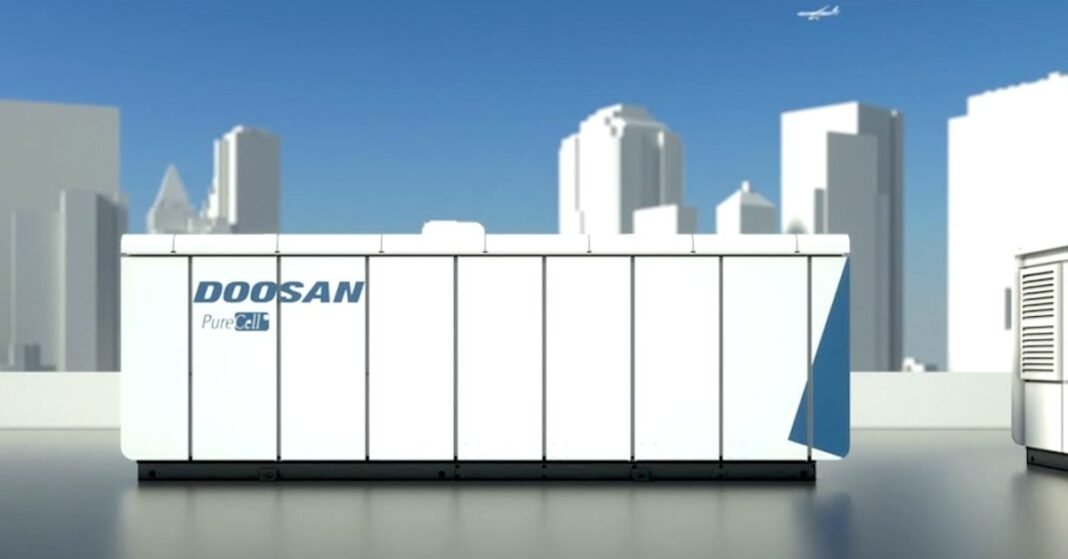Doosan and Air Products Cancel Over $1 Billion in Hydrogen Fuel Cell Contracts Amid Industry Doubts
In a surprising turn of events, South Korean firm Doosan and American company Air Products have made headlines by cancelling a staggering $1 billion worth of hydrogen fuel cell contracts in recent weeks. This significant reduction comes in the wake of operational delays and a shifting industry landscape, raising questions about the future viability of hydrogen technology.
Lead: In the span of just three days, Doosan Fuel Cell, a division of the South Korean conglomerate Doosan, and Air Products, an American leader in hydrogen production, have withdrawn from several multi-million dollar hydrogen fuel cell agreements, totaling over $1 billion. This development is yet another indicator of the challenges facing the hydrogen industry in a rapidly changing energy landscape, particularly for green hydrogen initiatives. The cancellations come as delays and infrastructure concerns continue to plague projects worldwide, prompting industry experts to question the future of hydrogen technology.
The Recent Cancellations and Their Implications
Doosan’s fuel cell division recently cancelled three major contracts, with the latest being a $273 million agreement and a $560 million contract with multiple partners. This decision marks a dramatic shift in the company’s operational strategy.
– **Contracts Cancelled**:
– A 110 MW hydrogen fuel cell supply contract with Korea Hydro & Nuclear Power Engineering, Kumho Technology, and LS Electric.
– Other projects worth over $500 million in partnership with Air Products.
These cancellations stem from prolonged delays in obtaining the necessary permits. A Doosan official commented, “As time passed after the contract, there were industry changes such as the emergence of the Clean Hydrogen Power Generation Obligation System (CHPS) bidding market, which influenced this decision.”
Financial Impacts and Business Strategy
Despite the magnitude of these cancellations, both Doosan and Air Products maintain that there will be no financial repercussions. The industry players assert that the contracts did not involve any advance payments or deposits, and they had not impacted the companies’ financial statements or order backlogs.
– **Key Points**:
– No advance payments or financial impacts reported.
– Decision influenced by shifts in the hydrogen market landscape, particularly the CHPS.
Doosan’s management extended the disclosure deferral period for the projects until the end of March, citing insufficient progress since 2022. This strategic pivot raises the question of how such cancellations will resonate with investors and stakeholders in light of increasing scrutiny of hydrogen technologies.
Changing Perspectives on Hydrogen Technologies
The recent cancellations come alongside a growing chorus of skepticism regarding the practicality of hydrogen as a viable energy source, especially as the world moves toward electric vehicles.
– **Statements from Industry Leaders**:
– Economists from France and Germany have urged European governments to focus on electric vehicle infrastructure instead of hydrogen.
– Industry executives increasingly question hydrogen’s feasibility in meeting future energy needs.
The shift in focus presents a stark contrast to earlier enthusiasm for hydrogen technology. Companies that were once committed to developing hydrogen infrastructure are now reconsidering their strategies in light of market changes and operational difficulties.
Investment Trends Amidst Doubt
While Doosan and Air Products pull back from hydrogen projects, other South Korean firms are continuing to invest in hydrogen solutions. Hyundai, for instance, has launched initiatives in hydrogen semi-trucks and fueling stations for various applications.
– **Continued Investments**:
– Hyundai is leading investments in new hydrogen technologies.
– There are ongoing projects related to vehicles and military applications.
Despite these efforts, the overall outlook remains uncertain, prompting many to wonder if continued investment in hydrogen will yield sustainable returns in the long run.
Broader Cancellations Reflect Industry Challenges
Doosan’s decision is not an isolated incident. Air Products has also recently cancelled a $500 million green hydrogen project in Massena, New York, which aimed to utilize hydroelectricity for hydrogen production. Additionally, the company abandoned another project in California.
– **Project Cancellations**:
– Massena project intended to harness local hydroelectric power.
– Air Products withdrew from a second hydrogen initiative in California.
These cancellations highlight a broader trend within the hydrogen industry, which has seen multiple high-profile projects fail to materialize amid regulatory hurdles and feasibility doubts.
Looking to the Future
The sustainability of existing hydrogen fuel projects, such as those led by Nikola (including the HYLA refueling stations) and Renault’s Hyvia, remains uncertain amidst these cancellations. As the hydrogen sector faces significant challenges, the industry is watching closely to see how it adapts to both market demands and technological hurdles.
Conclusion: The recent cancellations by Doosan and Air Products signal a potential turning point for the hydrogen fuel cell industry, stirring doubts about its future viability. As companies regroup and strategize, stakeholders are left to ponder whether hydrogen technology can overcome its current obstacles and emerge as a sustainable energy source. The focus is shifting towards more reliable alternatives, particularly in the electric vehicle sector, raising significant questions about hydrogen’s role in the energy transition.
Keywords: Hydrogen fuel cells, Doosan Fuel Cell, Air Products, hydrogen projects, green hydrogen, energy transition, electric vehicles, industry cancellations, investment challenges, hydrogen technology.
Hashtags: #HydrogenEnergy #CleanEnergy #Doosan #AirProducts #ElectricVehicles #SustainableFuture #EnergyTransition #FuelCell #GreenHydrogen
Source link



